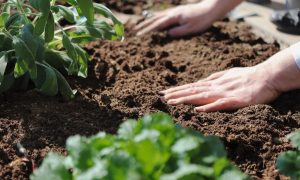
Importance of pH and EC measurements in seedling cultivation
At the end of January and the beginning of February, starts a campaign of sowing hot pepper seedlings as an important raw material for further processing into hot sauces, spice mixtures, and as additives in the production of beer, chocolate and similar, other vegetable crops, flowers and tobacco.
The production of seedlings is an important technological process in which specific rules must be followed.
There is no room for error in the production of seedlings (vegetables, flowers and tobacco) because time cannot be turned back and the planned production fails and can result is significant economical loss.
Also vegetable seeds are an economically large expense and all other inputs that are in that production cost.
Everyone who starts growing seedlings is recommended to properly select and prepare the soil and substrate, to check the pH value of the soil, to properly irrigate (EC measurement) young plantations in order to obtain quality seedlings.
The reason and importance of measuring the pH value in soil and substrate is that pH is a factor that affects the successful production of vegetables, the quality of vegetables and most importantly the yield of vegetables we grow.

The availability of nutrients in the soil is dependent on pH.
The pH value of the soil depends on the calcium content, the humus content in the soil and the soil structure.
Each vegetable crop has its own specific requirements for pH and which will have the best growth, yield and health. So that we can adjust the values of each culture according to their needs.
Type of vegetables pH
pH adjustments are the subject of another blog.
.
5.5 - 7.2
tomato, eggplant, parsley
5.5 - 6.5
watermelon, zucchini, peas, beans, legumes, celery, carrots
6.0 - 6.5
kale, brussel sprouts, cabbage, spinach, beets
6.0 - 7.0
peppers, cucumbers, onions
6.5 - 7.0
cauliflower, leeks, melons, lettuce
EC or electrical conductivity is a factor that expresses the concentration of mineral salts of a nutrient solution and is closely related to plant nutrition.
EC is a parameter that complements pH and it is a crucial value that allows us to measure the concentration of nutrients needed for plant development at each stage of plant development. This is necessary because by measuring these two parameters we can have healthy, strong and resistant plants that will bear abundant fruit.
The reason why the measurement of EC is important is that if our substrate is saturated with salts in plants, the metabolism of the substance is weakened and there is an excessive distribution (reverse osmosis) of nutrients. As a visible result, leaf scorching and tip burns can occur on the leaves, diseases can appear, such as mold and drying of leaves and whole plants.
In the cultivation of plants on substrates, the measurement of EC is essential because plants need fertilization with a mixture of mineral and organic nutrients for their growth and development.
By reducing EC, we remove salts in the water that will branch out the root system of plants, and plants will be able to make the most of added water and nutrients for their growth and fruiting.
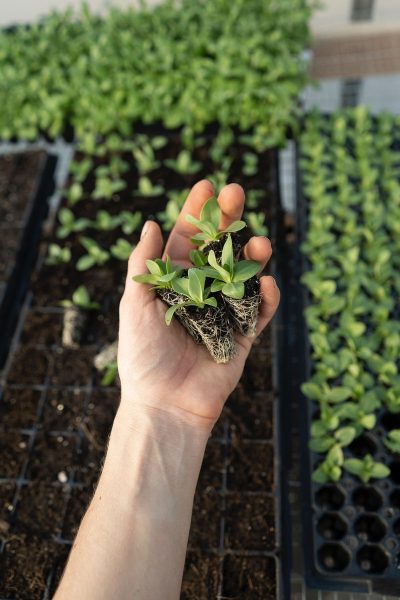
Watch your plants closely and see how they are reacting.
Direct measurement method – the fastest and most reliable method!
There are several options of meters on the market that measure soil pH and EC directly and giving you an instant result. Technique is very simple, a probe is inserted directly into the soil or soilless media and results is shown on the screen instantly.
Direct soil pH and EC testing gives you the benefit of not needing to take soil samples, because the testing takes place right on the spot.
How to Test Directly in Soil
- Using an auger, first put a hole down into the soil. The hole needs to be the same depth each time you test to avoid pH discrepancies.
- Add some distilled or deionized water to the prepared hole; the soil should be damp but not saturated with water.
- Insert your testing instrument into the hole, and allow for the reading to develop or stabilize.
How accurate is this method?
Each of our meters has a specifically designed probe for the application and specifications showing the resolution and accuracy.
HI98168 Professional Soil pH Meter GroLine
The HI98168 is a rugged, waterproof, portable pH meter that allows for the direct measure of soil pH. This meter is supplied with a specialized pH electrode that has a rugged conical tip for insertion in soil.
Besides being supplied with a unique pH electrode made for soil analysis, the HI98168 has the Hanna’s unique CAL Check™ feature that alerts the user to potential problems during the calibration process. This is a very important since it is likely that the probe will be coated with soil. This coating can easily lead to errors in pH measurement.
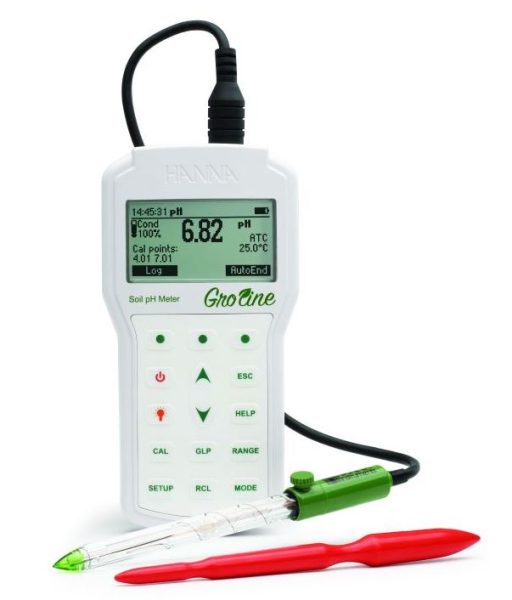
By comparing previous calibration data to the current calibration, the meter will inform the user, with display prompts, when the probe needs to be cleaned, replaced, or if the pH buffer might be contaminated. After calibration, the overall probe condition is displayed on screen as a percentage. The probe condition is affected by both the offset and slope characteristics of the pH electrode, both of which can be found in the GLP data including with the readings stored in the meter or transferred to a PC.
- Quick Connect DIN Connector;
- USB Connection for Data Transfer;
- Dedicated Help Button;
- ±0.002 pH Accuracy;
- Comes with all the necessary solutions and batteries- everything you need to get started measuring right away;
- Specialized electrode for spot checking the pH of soil and soil slurries;
Direct Soil EC Tester Soil Test™ HI98331
The Soil Test™ Direct Soil EC Tester – HI98331 is a rugged and reliable pocket-sized tester that offers quick and accurate readings. The Soil Test™ Direct Soil EC Tester – HI98331 features a stainless steel penetration probe for direct measurement of conductivity in soils. With a compact size, single button operation, and automatic calibration, Soil Test is an excellent choice for taking direct conductivity measurements in soil.
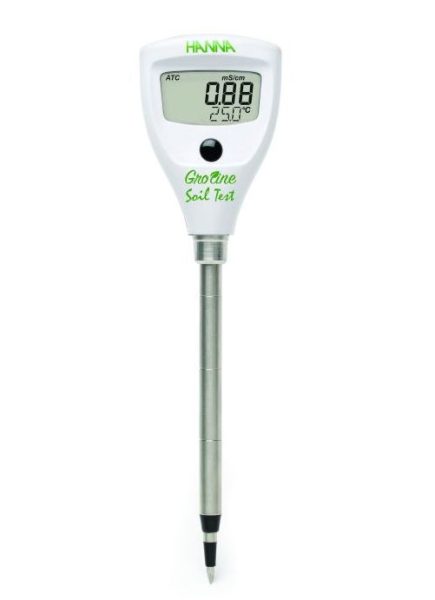
The World’s First pH Electrode with Bluetooth Smart Technology for the Direct Soil Measurement HI12922
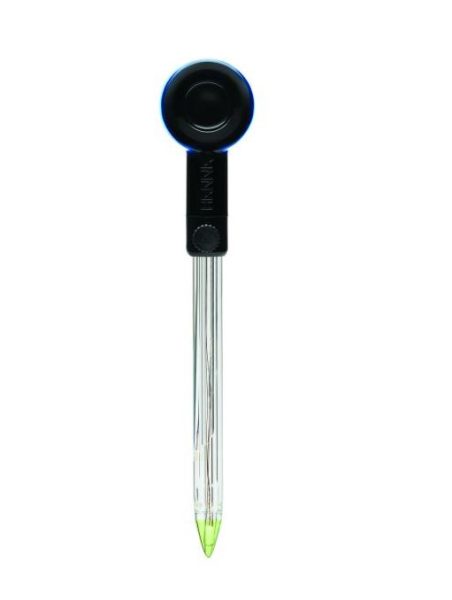
Wireless Soil pH Meter HALO® - HI12922
Our HALO® Wireless Soil pH Meter has a triple ceramic junction in the outer reference cell, built-in temperature sensor, and the conic pH sensing tip making it ideal for pH measurements in soil samples. All readings are transmitted directly to your Apple or Android device or the edge®blu.
Don’t worry, If this seems a bit too high-end for you, we have variety of testers also for the Hobby gardeners!
GroLine soil pH tester HI981030
s an application specific designed pH tester for the measurement of soil pH. This meter offers many advanced features including the ability to clear any clogging of the reference junction, which results in a longer life than standard pH testers.
- ±0.05 pH accuracy;
- Comes with all the necessary solutions and batteries- everything you need to get started measuring right away;
- Specialized electrode for spot checking the pH of soil and soil slurries;
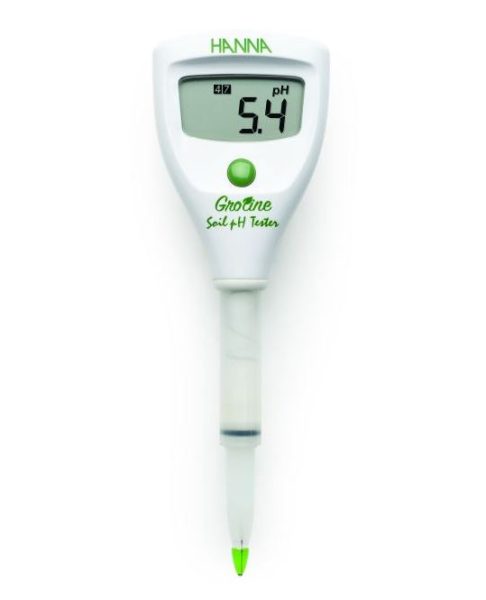
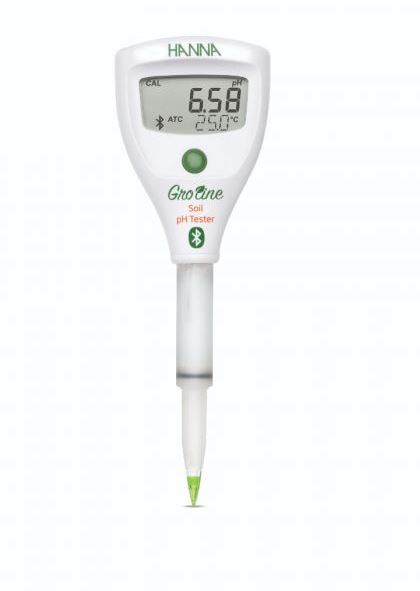
HALO2 GroLine Wireless pH Tester for Soil HI9810302
Is designed to bring simplicity to pH testing of soil for environmental and agricultural purposes.
- Open-source Bluetooth allows easy integration into current data logging systems;
- IP65 water resistant protection;
- Specialized electrode for spot checking the pH of soil and soil slurries;
- Equipped with everything you need for successful testing right out of the box;
Saša Perica, bacc.ing.agr.
Nives Vinceković Budor mag.ing.chem.ing.
https://www.savjetodavna.hr/wp-content/uploads/publikacije/presadnice_1412016.pdf
https://agrimatco.hr/strucni-savjeti/presadnice-u-kontejnerima https://hrcak.srce.hr/file/97447 https://www.agroklub.com/agro-hobi/instant-quoturadi-samquot-analiza-tla/12668/ https://planthouse.hr/priprema-sjetve-proizvodnja-presadnica-cuvanje-sjemena/


